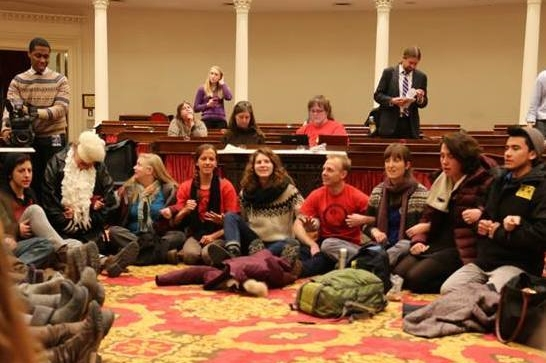Vermont Betrayal: Sit-In for Universal Care

Several hundred frustrated health care reform advocates staged a sit-in at the state capitol, chanting and singing, unfurling banners and refusing to leave. Photo: Jonathan Leavitt.
Four years ago, Vermont took a promising first step when its legislature passed Act 48, laying the groundwork for a pioneering public health care plan called Green Mountain Care.
As recently as last fall, despite damaging delays, Governor Peter Shumlin was still assuring voters that a brighter health care future lay just a few years ahead.
But six weeks after narrowly winning re-election to a third term, the governor abruptly abandoned universal health care.
On December 17 he called a press conference and declared that “now is not the time to ask our legislature to take the step of passing a financing plan for Green Mountain Care.”
ABOUT-FACE
According to the governor, a multi-millionaire former business owner, the latest projected cost of universal coverage would double the state budget in its first year alone, while requiring onerous new payroll and income taxes.
Can Vermont’s Plan Be Saved?
Act 48, the 2011 law that committed Vermont to a universal, publicly financed health care system, is still on the books.
The law mandated that Governor Shumlin come up with a financing proposal by January 2013. Two years late, it was finally supposed to be presented to the legislature this January. Several financing proposals were made, but the governor declared none was sustainable and refused to propose any.
An amendment presented to the Senate would tell the Green Mountain Care Board to examine a minimum of four public financing proposals, including one from the Vermont Workers’ Center, and bring back a report to the legislature.
Big business, meanwhile, still sees Act 48 as a threat, and is trying to repeal it.
– Traven Leyshon
The Vermont Workers’ Center, which helped mobilize statewide support for passage of Act 48 four years ago, countered the governor’s claims by releasing its own plan for financing the program.
One hundred economists endorsed the VWC approach, which relies on progressive taxation. The VWC also struck back with a clever “whiteboard” video, “The Time is Now: Healthcare Financing for Vermont, Explained in Three Minutes.”
But, of course, neither the quick tutorial nor the VWC’s full report garnered as much media attention—or had the same legislative clout—as Shumlin’s demolition.
LABOR PROTESTS
Several hundred frustrated health care reform advocates showed up at the governor’s January 8 inauguration in Montpelier—and they weren’t there to applaud. Instead they staged a sit-in at the state capitol, chanting and singing, unfurling banners and refusing to leave.

SUPPORT LABOR NOTES
BECOME A MONTHLY DONOR
Give $10 a month or more and get our "Fight the Boss, Build the Union" T-shirt.
“People had fought for this a long time,” says Liz Nikazmerad, president of United Electrical Workers Local 203 and a worker in the produce department of a Burlington grocery. “It was a huge win and to have the rug yanked out like that was very upsetting.”
By the end of day, the UE leader and 28 others—now known as “The Statehouse 29”—faced multiple criminal charges, including resisting arrest. The cases against 18 were later dropped; others settled by paying a fine or promising to do community service.
It was first in a series of angry labor sorties to Montpelier. During the legislative session, the bitter recriminations over the governor’s health care retreat morphed into broader controversies about workers’ rights, contract concessions, and what the Vermont Progressive Party calls Shumlin’s “austerity budget.”
Read More: Governor Turns the Hose on Workers
Abandoning universal health care, as it turned out, was only the opening shot in Vermont Governor Peter Shumlin’s barrage against working people this year.
But in the face of these assaults, the local labor movement is showing new energy...
OBAMACARE’S SOUR TASTE
Shumlin’s about-face on Green Mountain Care reflected more than revised estimates of its cost and feasibility. Unfortunately, Vermont was forced to create a private insurance exchange first, before the Affordable Care Act would permit experimentation of a different sort in 2017.
The troubled 2013 rollout of Vermont Health Connect, the state’s ACA-mandated private insurance exchange, hurt public perceptions of the longer-term goal, single payer. Lower-income people previously covered by state-subsidized plans ended up paying more out of pocket.
“Over the last few years, the Shumlin administration hasn’t done anything to give Vermonters confidence that we could handle being innovators in health care,” says Chris Pearson, a Progressive state rep and vice-chair of the House Committee on Health Care. “There were just too many bad headlines about the nightmare of enrolling, computer problems, and cost over-runs.”
As a result, polls show, the popularity of Green Mountain Care is not what it was even a year ago. The Vermont Workers Center plans to do more grassroots organizing around the shortcomings of Vermont Health Connect coverage.
BID FOR GOVERNOR?
Meanwhile, in the Vermont Progressive Party, Statewide Organizer Kelly Mangan has “gotten a lot of member feedback about running a candidate for governor next year.”
This is something her third party refrained from doing in the last three election cycles, to avoid putting a Republican in office—who would have opposed Act 48 from the outset or shelved it sooner than Shumlin did. Now, the growing estrangement of labor voters from the Democrats could lead to Shumlin’s replacement by a Republican anyway.
But personal health problems may prevent State Senator Anthony Pollina, the VPP’s most experienced statewide standard-bearer, from running for governor. (In 2008, he placed second in a three-way race).
And Vermont’s most successful progressive politician, U.S. Senator Bernie Sanders, seems more intent on seeking executive office higher than any available in Montpelier.
A much longer version of this piece first appeared in Working In These Times.






